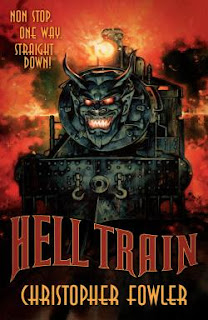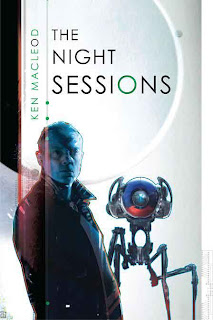

The Flame Alphabet: Alfred A. Knopf hardcover, January 2012, 289 pages, cover design by Peter Mendelsund. Ben Marcus is a highly regarded mainstream author, but The Flame Alphabet is his first science fiction or fantasy novel. It reached the second round by defeating Mark Chadbourn's The Burning Man in the opening round and Eric G. Wilson's Everyone Loves a Good Train Wreck in the second round.
In The Flame Alphabet, an epidemic has made children's speech toxic to adults. Over the first 50 pages, our protagonist Sam and his wife Claire realized that their teenaged daughter Esther was the source of their ailment. Over the next 50 pages, even as Claire's condition worsens badly, they prove unwilling to distance themselves from Esther. Sam attempts to understand the disease through useless experiments and advice from his strange neighbor and his secretive religion.
The Man from Primrose Lane: Farrar Straus & Giroux hardcover, March 2012, 365 pages, cover photo by Michael Lewis. The Man from Primrose Lane is true-crime writer James Renner's first novel. It reached the second round by defeating Weston Ochse's Blood Ocean in the first round and upsetting a "seeded" book, Saladin Ahmed's Throne of the Crescent Moon, in the second round.
The opening 50 pages of The Man from Primrose Lane introduced the mystery, investigated by crime writer David Neff, of the murder of the reclusive Man from Primrose Lane (the "MFPL"). Over the next 50 pages, David meets with the detective assigned to the crime, who tells him the death may not have been murder at all, and with Katy Keenan, who never knew the MFPL and yet he kept a diary of her movements. All of this somehow connects to David's wife Elizabeth, who recently committed suicide, and whose twin sister was kidnapped as a girl and never heard from again.
The Battle: When mainstream authors write science fiction or fantasy, a key aspect they often get wrong is the suspension of disbelief. The reader has to feel like what's going on in the story is really happening, that it's not just a mental exercise. This requires the author to treat the fantastic elements seriously, and for the characters to react the way real people would (or at least might) if the story were actually taking place.
In the second 50-page section of The Flame Alphabet, Ben Marcus stumbles badly in this respect. In the first 50 pages, he established a worldwide affliction so severe it threatens the existence of the entire human race. But then he goes off on lengthy tangents about the protagonist's peculiar, secretive sect of Judaism. Sam has to go to a hut in the woods to hear sermons through a strangely organic "listener," which he assembles and is required to hide when the sermon is over. On page 80, Sam is mortified to realize he left the listener in the hut, so an outsider conceivably could hear one of the sermons. This scene would work fine in an angsty mainstream novel about a guy in a midlife crisis. In the middle of a story about the human race in an existential crisis, it feels completely trivial. Ditto Sam's sense of awkwardness in conversations with his weird neighbor. For Marcus to focus on these trivial aspects of the story suggests he is not taking his own apocalyptic story concept seriously.
Even worse, his characters don't seem to take it seriously. Neither the protagonist Sam nor his wife Claire nor anyone we've seen acts the way people would act if this story were really happening. By 50 pages into the novel, it has been established that people are dropping dead all over the place, and although nobody understands it, they all know the deaths are caused by the speech of children. Yet through 100 pages, with Claire nearing death, Sam has never once told his daughter Esther to shut the fuck up. In real life, parents tell their kids to shut up when they can't hear the television, but in this book Sam can't bring himself to say it with Claire's life in danger? On a societal level, Marcus has made passing reference to the fact that some parents have sent their children away or have gone to hide in the hills, but has failed to address the turmoil that would entail. How would people heading to the hills even survive, with society collapsing?
Another example: when some children pass by, the weird neighbor sticks some gloop into Sam's mouth and suddenly the children's speech isn't painful to Sam. This action was uninvited and undertandably upsets Sam. But it would take a real person about five seconds to get over that revulsion and say something like, "What was that stuff and can I have some for my dying wife?" Instead, Sam just avoids the guy.
Ben Marcus seems to be focused on the metaphorical import of his book's concept, at the expense of the story. So he shows roving packs of kids intentionally shouting at adults to hurt them for a lark. This may symbolize generational conflicts somehow, but on the level of story, I just don't buy it. I believe most kids would be worried for their families and afraid about what will happen if all the adults die; what's more, I think that would make for a more powerful story.
Meanwhile, in the second fifty-page section, the story of The Man from Primrose Lane just keeps getting better. Each scene in this section builds on one of the levels of the story, all of which work well individually, and we're starting to see more connections between the different levels.
So in one scene, David interviews Detective Sackett about the death of the MFPL. Sackett (the detective we saw in the Prologue, who I'm delighted to have back onstage) tells David that the victim did not die from his gunshot wound, but from blood loss when his fingers were cut off and put in his blender. Sackett believes the man cut off his own fingers to destroy his fingerprints, so as to continue to hide his identity, which also explains why he always wore mittens even in hot weather. At the same time, David learns that Sackett is conducting a cold-case investigation of a child abduction: the kidnapping of Elaine, the sister of David's late wife Elizabeth. David and Sackett both notice the uncanny resemblance between Elaine and Katy, the woman with whom the MFPL was obsessed. The realization about the fingers in the blender makes the mystery story more intriguing to me than a typical whodunit. At the same time, this scene establishes that the mystery is connected somehow to David, his late wife, and her missing sister. I'm skeptical that Renner can convincingly explain these coincidences, but at this point I'm enjoying things so much I don't care.
Before and after this interview, Renner gives us flashbacks to David and Elizabeth's wedding and honeymoon. Elizabeth was already mentally fragile at that time, and David knew it. So he panics when she says, "I can't do this," and urgently tries to convince her that things will work out, before realizing she meant she didn't know how to use her chopsticks. These scenes are charming, but with a bittersweet undercurrent, because the reader knows these happy times will turn sour enough for Elizabeth to commit suicide. Indeed, we learn she was already having suicidal thoughts even on the honeymoon, from which she turned aside in a terrific scene I don't want to spoil, except to say it relates to the mystery of the MFPL.
Renner follows that up with a sweet scene in the present day with David and his son Tanner, then an interview/date with Katy. We learn that Katy was nearly abducted as a girl in the same way Elaine was ten years earlier, but was apparently saved by the MFPL. Meanwhile, Renner throws in little details, like Tanner's obsessive hobby and odd pictures of people with clown noses in the restaurant where David takes Katy, which are amusing but also relevant to the story. And we finally get some fantastic elements, for example flashbacks to creepy and inexplicable events that followed the materials sent by an executed serial murderer to the paper where David worked when he first became a crime writer.
Then the fifty-page section ends with David realizing he is a suspect in the death of the MFPL.
If a book gets to the semifinals of the Battle of the Books, it means I really like the author's writing and the story concept. Now in the semifinals, as I get deeper into the tale, the question is whether the author can maintain and build on whatever interested me in the story, or whether things will start to unravel. In pages 51-100, The Flame Alphabet lost me, while James Renner successfully pulled me deeper into the story of The Man from Primrose Lane.
THE WINNER: THE MAN FROM PRIMROSE LANE by James Renner
The Man from Primrose Lane advances to the championship match, to take on The Night Sessions by Ken MacLeod.
To see the whole bracket, click here.



